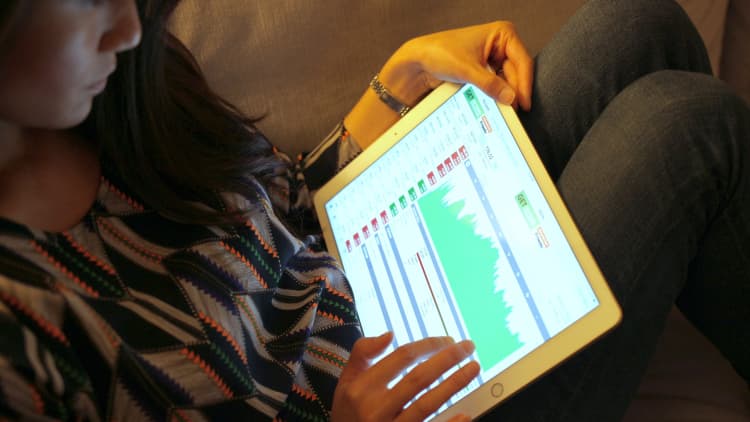Goldman Sachs is renewing its push into Wall Street's digital future.
The firm made Mathew McDermott, a managing director who ran the investment bank's internal funding operations, its new global head of digital assets last month, CNBC has learned exclusively.
The appointment means the newest face of blockchain and cryptocurrency on Wall Street isn't a starry-eyed bitcoin evangelist or ostentatious start-up founder, but a 46-year-old veteran of old-school financing markets. McDermott replaces Justin Schmidt, an MIT-educated former crypto trader and quant who ran Goldman's digital assets team since 2018.
McDermott, who is based in London, does have a radical vision for markets, however: a future in which all of the world's financial assets reside on electronic ledgers, and activities that today require squadrons of bankers and lawyers like initial public offerings and debt issuances could be largely automated.
"In the next five to 10 years, you could see a financial system where all assets and liabilities are native to a blockchain, with all transactions natively happening on chain," McDermott said in an interview. "So what you're doing today in the physical world, you just do digitally, creating huge efficiencies. And that can be debt issuances, securitization, loan origination; essentially you'll have a digital financial markets ecosystem, the options are pretty vast."
Goldman's movements are closely watched in blockchain and crypto circles as proponents have seized on anything the bank does as evidence of the technology's broader adoption. The bank recently drew the ire of the Winklevoss twins, co-founders of the cryptocurrency exchange Gemini, for a report from its consumer and investment management division that declared that bitcoin isn't an asset class.
As hype and media coverage of the space has cooled down, there are signs of growing conviction among business leaders that distributed ledgers including blockchain will have a real impact, according to a global survey by Deloitte. Enterprise applications were a bright spot as funding for blockchain-related start-ups fell 28% last year from $4.3 billion in 2018, according to CB Insights.
At Goldman, McDermott is expanding his team, doubling its headcount with hires in Asia and Europe. He has also lured talent from a key competitor: JPMorgan Chase's head of digital assets strategy Oli Harris has joined the bank, according to people with knowledge of the move.
Harris was involved in JPM Coin, the first digital coin from a major bank unveiled last year that is intended to help disrupt the global payments industry. He was a vice president in charge of Quorum, the ethereum-based blockchain platform that underpins the JPM Coin.
In his first interview as head of digital assets, McDermott said he has near-term goals and more ambitious projects. A pragmatist and competitive triathlete, he is concerned that his projects are both achievable and of clear commercial value to Goldman and its counterparties.
First up is helping the essential plumbing of finance like repurchase agreements, known as the repo market, go digital, he said. Banks and hedge funds rely on the short-term funding for daily operations, and more than $1 trillion typically flows through the market every day.
"In securities finance and repo, if you look at those markets, they're ripe for standardization," he said. "There's a lot of legacy processes in the vast movement of collateral that makes them very cost inefficient, so by leveraging distributed ledger technology, you can standardize processes to manage collateral across the system, and you have a much more efficient settlement process given the real time settlement."
In his previous role, where he was global head of cross asset financing, McDermott helped fund Goldman's trading activities by tapping repo and other markets and issuing debt, expertise that set him up for his current job. He joined Goldman in 2005 from Morgan Stanley.
Further out, McDermott is looking at how ledger technology can be used in the massive credit and mortgage markets, and even the possibility that trading markets could eventually migrate to the format.
But crucial to any of these efforts is building consensus with other banks, institutional investors and regulators. The technology will only take off when it gains a critical mass of users across the world of finance, he says, adding that industry consortiums are the best way forward.
Given that approach, McDermott says he spends a lot of time talking to other companies, including JPMorgan and Facebook, the social network that recently updated its cryptocurrency strategy to appease regulators.
He even hinted that one Goldman project involves collaboration with JPMorgan, potentially regarding how the two banks' nascent technology efforts could work together. JPMorgan created the JPM Coin, which is pegged to the U.S. dollar, to pay for transactions that migrate to the blockchain.
Goldman is also now examining the possibility of creating its own coin, McDermott said: "We are exploring the commercial viability of creating our own fiat digital token, but it's early days as we continue to work through the potential use cases."
If McDermott is eventually successful, the nature of an entire lucrative ecosystem of bankers, lawyers and back office personnel will be upended forever. He doesn't shy away from the implications.
"The honest answer is, of course, with any technological advancement, there will be a disruption to the existing status quo," he said. He cited businesses, like custody firms, that are actively embracing the future by investing in projects.
While McDermott wouldn't say whether he personally owned any cryptocurrency, he did have an observation that will probably raise cheers in the crypto world. Since the boom days of bitcoin a few years ago, interest has shifted from retail and rich investors to large institutions, he said.
"We've definitely seen an uptick in interest across some of our institutional clients who are exploring how they can participate in this space," he said. "It definitely feels like there is a resurgence of interest in cryptocurrencies."



